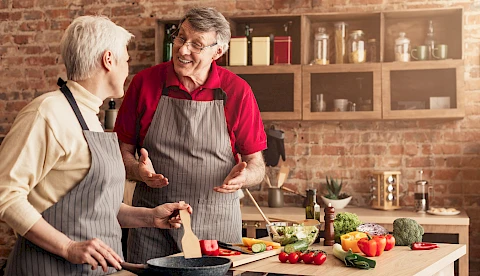
Cooking can be a wonderful activity for seniors, offering a sense of independence and the joy of preparing their favorite meals. However, it's important to ensure that cooking practices are safe to avoid accidents and foodborne illnesses and accommodate physical limitations. This guide covers food handling, storage, and kitchen safety modifications, with tips for adapting cooking methods to suit the needs of seniors.
Food Handling Safety
Proper food handling is crucial for preventing foodborne illnesses. Here are some key practices:
- Proper handwashing techniques: Wash hands with soap and warm water for at least 20 seconds before and after handling food.
- Safe handling of raw and cooked foods: Keep raw meat, poultry, and seafood separate from other foods. Use separate cutting boards for raw and cooked foods.
- Avoiding cross-contamination: Clean and sanitize cutting boards, utensils, and countertops after preparing raw foods.
- Using fresh ingredients: Always check expiration dates and avoid using ingredients that look or smell spoiled.
Food Storage Tips
Proper food storage helps maintain food quality and safety. Keep the refrigerator at or below 40°F and the freezer at 0°F or lower. Use airtight containers and label them with the date of storage to keep track of freshness.
Consume leftovers within 3-4 days and store deli meats for no more than 5 days. Place frequently used items on lower shelves and at the front for easy reach.
Kitchen Safety Modifications
Making simple modifications in the kitchen can enhance safety for seniors. Ensure the kitchen is well-lit to prevent accidents and keep frequently used items within easy reach. Store pots, pans, and utensils at waist level to minimize the need for bending or stretching.
Use appliances with automatic shut-off features and tools with large, easy-to-grip handles. If you introduce a new appliance, take a few minutes to show your senior loved one how to use it safely.
Adapting Cooking Methods for Physical Limitations
Adjusting cooking methods can make meal preparation easier for seniors with physical limitations. Choose simple recipes with fewer steps and ingredients, and ask if your senior loved one feels comfortable trying out the recipe in question.
Invest in easy-grip utensils, jar openers, and other adaptive tools designed for seniors. Also, consider incorporating one-pot meals and slow cookers. These reduce the need for multiple pots and pans, making cleanup easier. Try using seated meal preparation whenever possible. Use a sturdy chair or stool to sit while preparing meals, reducing the strain on the legs and back.
Contact Senior Helpers for Assistance With Safe Cooking Practices
Implementing safe cooking practices is vital for seniors' health and well-being. By following proper food handling and storage guidelines, making kitchen safety modifications, and adapting cooking methods, seniors can enjoy cooking without compromising their safety.
Encouraging these practices not only helps maintain independence but also ensures a healthier and more enjoyable cooking experience. For personalized senior care and support in Naperville, Aurora, Oak Park, Berwyn, and Willowbrook, contact us at Senior Helpers Naperville today.